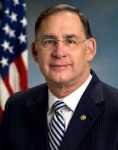- Supporting Americans with Disabilities and Their Families (3/6/25)
- Standing Up for Sportsmenís Access and Safety (2/20/25)
- Bringing Farm Country Voices to Washington (2/12/25)
- A New Front in the Fight Against Prostate Cancer (2/6/25)
- Taking Action to Reverse Immigration Failures and Protect Communities (1/30/25)
- Setting the Agenda for 2025 (1/22/25)
- Making progress for Arkansasís water infrastructure (1/16/25)
Help Wanted: Getting Arkansans Back To Work
Arkansas, like other states, is rebounding from the pandemic in a stronger position than we might have expected around this time last year.
Recently, Governor Hutchinson announced the state had the largest budget surplus in our history at $980 million. Additionally, unemployment in the Natural State is now at 4.4 percent, down from 10 percent in May 2020 and almost two percent below the current national average.
Last month the governor announced Arkansas will opt out of the federal supplemental unemployment assistance program. The move, which becomes effective later in June, is designed to encourage more Arkansans to rejoin the workforce now that we are getting back to normal through widespread access to the COVID-19 vaccines and better understanding of the transmission of the virus.
I applaud the governor for taking this step to help spur economic recovery. As I talk with business owners around the state, it is clear that labor is in short supply. Common sense tells us that an enhanced $300 per week federal unemployment supplement, on top of existing benefits, is contributing to this shortage of workers.
When the governor made the decision to end Arkansas’s participation in the supplemental payment, there were more than 40,000 open jobs across the state of Arkansas.
According to the Arkansas Division of Workforce Services, when combining the federal unemployment stipend with the maximum state benefit, weekly unemployment insurance payments in our state can be as much as $751 per week – or about $19 an hour.
You don’t have to look far to see the effects of that reality in our communities.
Many businesses, including local restaurants and retailers, are being hit hardest when it comes to the difficulties that come with being short-staffed – limiting hours of operation, capacity and services. Even those able to offer higher wages and other competitive benefits are having trouble filling open positions.
Paying people not to work, especially now that we can safely and confidently return to activities that were risky at the height of the pandemic, is clearly an obstacle that the private sector can’t compete against.
Even the Biden administration has tacitly acknowledged the connection between continued enhanced unemployment benefits and labor shortages. The president recently directed the Department of Labor to work with states to reinstate requirements that those receiving unemployment benefits show they are actively seeking work and must accept a suitable offer of employment.
Employers are desperate for more help. They are telling anyone who will listen about how this crisis is affecting their ability to stay open and provide the services their customers rely on.
It is incumbent on policymakers at every level to help create an environment where work is encouraged and rewarded. Temporary relief was necessary to help Arkansans and all Americans directly impacted by the pandemic, but thankfully we are rapidly closing the door on that chapter.
The “help wanted” signs we see hanging in the windows of our favorite local shops and restaurants are as clear a sign as any that we’ve got to do everything we can to mobilize and empower workers to get back into the job market. In Arkansas, we are on that path now and must keep at it.
Posting a comment requires free registration:
- If you already have an account, follow this link to login
- Otherwise, follow this link to register

